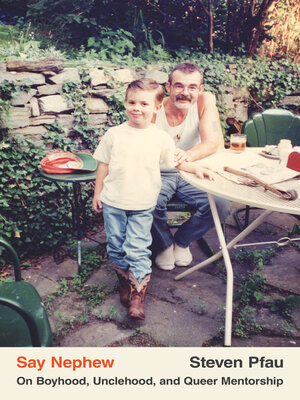
Sign up to save your library
With an OverDrive account, you can save your favorite libraries for at-a-glance information about availability. Find out more about OverDrive accounts.
Find this title in Libby, the library reading app by OverDrive.



Search for a digital library with this title
Title found at these libraries:
| Library Name | Distance |
|---|---|
| Loading... |
For readers of Maggie Nelson and Jeremy Atherton Lin, Say Nephew is an eclectic and inquisitive exploration of the rich and complex mythology of gay uncles
Blending memoir and criticism, Steven Pfau pays tribute to the gay uncles who have shaped his sense of queer identity, culture, and history. The most influential—the mentor who would set the standard for all of Steven’s future mentors—was his uncle Bruce.
A charismatic storyteller with a Burt Reynolds–esque bravado (and a mustache, leather jacket, and pair of cowboy boots to match), Bruce came out in 1950s Memphis and lived in New York City through many of the defining events of the gay liberation era. Bruce was both a unique fixture in Steven’s upbringing and an archetypal figure within a much broader history—a link in a long lineage of uncles, literal and figurative, who have offered various forms of queer tutelage to younger men.
But what role is the nephew supposed to play in these bonds? And who does he become once his uncles are no longer there to guide him? Both a coming-of-age story and a wide-ranging study, Say Nephew is a wholly original and expansive consideration of queer mentorship.
Blending memoir and criticism, Steven Pfau pays tribute to the gay uncles who have shaped his sense of queer identity, culture, and history. The most influential—the mentor who would set the standard for all of Steven’s future mentors—was his uncle Bruce.
A charismatic storyteller with a Burt Reynolds–esque bravado (and a mustache, leather jacket, and pair of cowboy boots to match), Bruce came out in 1950s Memphis and lived in New York City through many of the defining events of the gay liberation era. Bruce was both a unique fixture in Steven’s upbringing and an archetypal figure within a much broader history—a link in a long lineage of uncles, literal and figurative, who have offered various forms of queer tutelage to younger men.
But what role is the nephew supposed to play in these bonds? And who does he become once his uncles are no longer there to guide him? Both a coming-of-age story and a wide-ranging study, Say Nephew is a wholly original and expansive consideration of queer mentorship.







